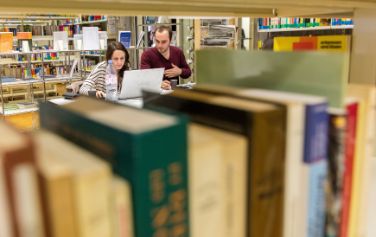Engineering and Computer Science Library Biel/Bienne
The Engineering and Computer Science Library in Biel is part of the BFH library and a member of the Swiss Library Service Platform SLSP/swisscovery. It is open to the public.
Opening hours
Mon–Thu
8am–5.30pm
Fr
8am–5pm
No lending
1pm–2pm
Access
for all members of the School of Engineering and Computer Science in Biel with BFHcard around the clock.
Special opening hours
- Ascension: Wed, 28 May, open 8am–1pm, closed in the afternoon
- Summer: Mon, 14 July – Thu, 11 September, open 8am–1pm, closed in the afternoon
Closed
- on all national holidays
- Thu, 5.6.2025
- Christmas/New Year Monday, 22 December 2025 – Sunday, 4 January 2026
Contact
13 May 2025 : Free Virtual IEEE Authorship and Open Access Symposium: Tips and Best Practices to Get Published
This free live webinar will provide authors with best practices in preparing a manuscript, navigating the journal submission process, and important tips to help an author get published. It will also review the opportunities authors and academic institutions have to enhance the visibility and impact of their research by publishing in the many open access options available from IEEE.
This session will feature the perspective of distinguished author, editor, and professor, Dr. Saifur Rahman from Virginia Tech, USA, who will provide critical insights on IEEE’s peer review and submission processes and tips on what editors look for in submissions. In addition, presenters from IEEE will be on hand to cover topics such as IEEE open access programs for institutions, research strategies using IEEE Xplore, author tools, and other important resources for authors.
Topics to be Covered
How to increase the visibility and impact of your research
Tips and best practices to improve your chances of getting published
What editors and reviewers look for in submissions
Common reasons why papers are rejected
Selecting the right publication for your research submission
Updated author guidelines regarding the use of AI-generated text
Warning signs to look for to avoid predatory journals
Reasons to consider open access journals for your submissions
Open access options available from IEEE for authors and institutions
Research strategies using IEEE Xplore Digital Library
Authorship tools available for promoting open science
Live Q&A: Our experts answer your questions live!
Event Details
Event Title: IEEE Authorship and Open Access Symposium: Tips and Best Practices to Get Published from IEEE Editors
Date: Tuesday, 13 May 2025
Time: 3:30 p.m. CET
Duration: 90 Minutes
Search platform swisscovery short course
swisscovery is the national search platform of academic libraries in Switzerland.
In our short course you will learn ...
- ... how to use swisscovery efficiently
- ... how to borrow books and how to download e-books.
Dates
- Thursday, 23 January 2025, 4.30pm (German)
- Monday, 27 January 2025, 12 noon (French)
- Tuesday, 18 February 2025, 4.30pm (German)
- Tuesday, 25 March 2025, 4.30pm (French)
- Wednesday, 26 March 2025, 12 Uhr (German)
- Tuesday, 22 April 2025, 12 Uhr (German)
- Friday, 23 May 2025, 12 noon (French)
- Monday, 26 May 2025, 12 Uhr (German)
- Thursday, 26 June 2025, 4.30pm (German)
Info on the short courses
- Duration: 30 minutes
- Registration: not necessary
- The short training sessions will take place via MS Teams.
Information about swisscovery can be found at bfh.ch/slsp
If you have any questions, please contact bibliothek@bfh.ch
Contact us if you would like to have a short course on a different date or in English.
Note on data protection
You can participate in the training, which takes place virtually via MS Teams, using the link above. Only your dial-in and registration data will be transmitted via MS Teams. Sound and image data will only be processed if you allow this in your settings (microphone, camera). The Bern University of Applied Sciences does not store any personal data that can be seen from the event; in particular, no recording is made. In addition, the BFH has chosen MS Teams, a program for which compliance with the standards required by data protection law is assured. The responsibility for the operation of the software lies with the provider. Details on the processing of personal data can be found in the provider's data protection information. By participating, you consent to the processing of your personal data.
Assistance
Are you looking for information about a specific topic? Do you need help with your research? Would you like to find out about the (online) resources available in your subject area?
Get in touch and make an appointment for a 30-minute consultation: E-Mail.
Have a look at our Moodle course as well (for students and employees of the BFH)
Borrowing + access to online resources
With us you will find literature on
- Automotive engineering
- Data Engineering
- Electrical engineering and information technology
- Computer Science
- Medical Informatics
- Mechanical engineering
- Mechatronics and systems engineering
- Industrial engineering and management science
- Mathematics, Natural Sciences, Business and Communication
Important links
Borrowing
The physical media are generally freely accessible and can be borrowed (prerequisite: swisscovery account). They can be searched via swisscovery.bfh.ch.
Access to online resources
The electronic media or online resources are accessible to students and employees of the BFH in the BFH network, i.e. in the WLAN «bfh», or via VPN. For other visitors, they are available at the research stations in the library.
Facilities
- 40 workspaces
- 2 PC workspaces
- Daily newspapers, weekly press
- Multifunctional device: printer, copier, scanner
- Self-check
Literature search
The collections of the BFH Library (books, periodicals, DVDs, etc.; except for the library of the Abegg Foundation) can be searched using swisscovery.bfh.ch
We welcome suggestions for new purchases. Send us as much information as possible (author, title, publisher, ISBN) and your user number via email.
Online resources
Engineering + Computer science
Medical Informatics + Health
Business
More online resources
Standards
E-Learning "The basics of national and international standardization"
Using a case study, this course covers what standards are, what added value standards create, how standards are established and how to be involved, and which are the main national and international standards organizations. Duration approx. 30 minutes.
ETSI
The European Telecommunications Standards Institute (ETSI) is the recognised regional standards body in Europe for telecommunications, broadcasting and other electronic communications networks and services. It develops worldwide standards in these areas and supports European regulations and legislation by creating harmonised European standards.
The standards are available free of charge and can be downloaded as PDFs.
IEEE Xplore
IEEE standards are international technical standards for electrical engineering, electronics, information and communication technology and computer science.
SNV-Connect
Successor solution to the e-Norm database. In addition to references, it contains the full texts of all ISO standards as well as current Swiss standards:
- SWISSMEM
- Electrosuisse
- INB Interdisciplinary standards section (SNV)
- SIA
The full texts can be saved and printed as PDF. They may not be passed on to third parties. Log in with your SWITCH edu-ID.
SNV-Connect also offers the Standards compendium 2022 (read only).
VSS
Standards of the Swiss association of road and transportation experts.
Students can register free of charge (Mitgliedschaft für Einzelpersonen > Beitrittsgesuch). This gives them access to the complete digital body of VSS standards and publications.
Bachelor and Master theses
The book search provides access to abstracts of all students’ bachelor’s theses since 2012.
You can search the abstracts by key words or by divisions.
The archive contains abstracts of the works from 2006 to 2011.
Literature search support
Lean Library – find scientific literature faster
The browser extension Lean Library leads you directly to electronic full-text content offered by your BFH library.
Download Lean Library
- Open leanlibrary.com/download
- Install browser extension
- In the settings select the library: Berner Fachhochschule
- Begin your search for academic literature. The Lean Library pop-ups lead directly to the full-text.
For best results, always activate the VPN.
Try Lean Library after download
- If the article you are looking for can be found on different platforms, Lean Library will take you to where you have direct access. >> test link
- If the e-book you are looking for is offered by the BFH libraries, Lean Library will take you directly to the free download. >> test link
- If you need a password to access a source, Lean Library will inform you accordingly. >> test link
- If you wish to search the swisscovery library system using a specific search term, click on the desired search term with the right mouse button on any website and select "search@BFH".
Search directly in swisscovery with Lean Library
Lean Library enables you to initiate a search on the swisscovery search platform from any website:
- highlight one or more terms
- right-click with your mouse
- choose “Search@BFH” in the drop-down menu
- proceed to search in swisscovery
If you have any questions, contact us: bibliothek@bfh.ch
The basics of literature research
The Moodle course BFH Literature Search gives BFH students an introduction to researching scientific literature.
- Why Google is not enough
- From the research question to the search terms
- Scientific literature and its differences
- Tips for the search
- etc.
You can decide based on various criteria whether or not you should use a resource when preparing your research paper. The following checklist provides a basis for decision making:

The appropriate search tool
Depending on the type of publication, you can choose the appropriate search tool:
- You will find books and e-books using swisscovery. For e-books the section “Consult online” directs you to the full-text. The design of the button or link for downloading can vary greatly: “Full-text”, “PDF”, “Read”, etc.
- You can find periodical articles using specialized subject databases.
The periodicals themselves can be accessed via swisscovery if the database does not include the full-text (see the paragraph “Finding periodical articles”) - The library also provides search tools for norms, images, statistics, newspapers, etc.
Always look for the “search@BFH” button. It often leads directly to the text you are searching for.

Finding periodical articles
Install LeanLibrary, a browser extension, to support your research.
Activate your BFH VPN, even when using Google or Google scholar, for ex., as this can in some cases lead directly to the full-text.
Searching in Subject Databases
Journal articles can be found primarily in bibliographic subject databases. You will often find direct access to full-text PDFs here as well. Depending on the database, the design of the download buttons or links can vary greatly: «Full Text», «PDF», «Read», etc.
Sometimes the DOI or «digital object identifier» directs to the full-text.
Also pay attention to the «search@bfh.ch» button, as this can also direct to full-text.
Finding journal article full-text
In some bibliographic databases you will find neither full-text access nor PDFs, only citations for the articles you need. In this case, go to the swisscovery search platform.
Search in swisscovery using the title of the journal instead of the title of the article. Then use «Tweak your results», go to the heading «Resource Type» and choose «Journals».
If the electronic version of the journal is available, you will be directed to the journal full-text by clicking on the “Available Online” link and you can then find and download the article PDF. In some cases, you may need to enter a password again (“Passwords”).
If the journal is only available in print, you can copy or scan the article at the library where it is located.
If the BFH Library does not have the journal you need in its collections, broaden your search to include all of swisscovery, i.e. all member libraries (drop-down menu next to the search box). You can often order the journal issue for loan.
Some swisscovery member libraries allow you to order copies or scans for a fee. Alternatively, use the service Orders for Copies of the University Library of Bern.
Offer for BFH employees
You need a journal article, but the BFH library doesn't have a licence? Send us as many details as possible about the article and we will deliver it to you: bibliothek@bfh.ch
Literature management
Using reference management software you can
- enter your literature references,
- organize them,
- import references from swisscovery and specialised catalogues,
- export references into text documents.
In the Moodle course Literature Management, BFH students and employees receive instructions and training dates for the reference management software Zotero.
Writing scientific texts
Writing is not a question of talent. Writing is a question of practice. Especially when it comes to writing scientific texts.
In the Moodle course "Schreiben – écrire – writing" BFH students can find instruction in the art of academic writing and helpful suggestions for getting started with the writing process. The course is intended to introduce you to the topic and can later be used for reference purposes, as needed.
Team
The Engineering and Computer Science Library in Biel is part of the BFH library.




